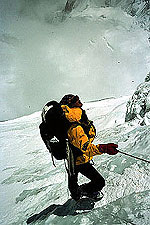
|
 |
 |
 Assault on the Summit
Assault on the Summitpart 3 | back to part 2 The Physiology of Acclimatization At altitude, hypoxia increases the breathing, which brings more air, and thus more oxygen, into the lungs. At the same time, the heart rate increases, pumping more oxygen-loaded red blood cells to the tissues. This is the beginning of the process of acclimatization, the series of changes occurring throughout the body which tends to restore the oxygen pressure in the tissues toward that at sea level. After several weeks at altitude, the volume of plasma drops, the number of red blood cells increases (by as much as 50%), and hemoglobin increases, all helping the blood to carry more oxygen to the tissues. Acute Mountain Sickness The most common affect of altitude on the body is Acute Mountain Sickness (AMS), which induces headaches, nausea, and weakness, but usually improves by itself in a day or two. Although each climber acclimatizes differently, the headaches are standard fare for even the least affected mountaineers, like Araceli: "The only problem I have with altitude is I get headaches. But I just take an aspirin and that's all, it's not a problem. I used to be good at acclimatizing. But 8,800 meters—I've never been so high. I don't know what it'll be like." About a quarter of those who ascend too rapidly above 9,000 feet will develop AMS. By ascending slowly, no more than 1,500 feet per day over 10,000 feet, climbers give their bodies time to acclimatize, and symptoms can be avoided. On Everest already this spring, a half dozen climbers have been evacuated or have had to abandon their summit bids because of serious mountain sickness on ascent. Continue Photos: (1) courtesy David Breashears. Lost on Everest | High Exposure | Climb | History & Culture | Earth, Wind, & Ice E-mail | Previous Expeditions | Resources | Site Map | Everest Home Editor's Picks | Previous Sites | Join Us/E-mail | TV/Web Schedule About NOVA | Teachers | Site Map | Shop | Jobs | Search | To print PBS Online | NOVA Online | WGBH © | Updated November 2000 |